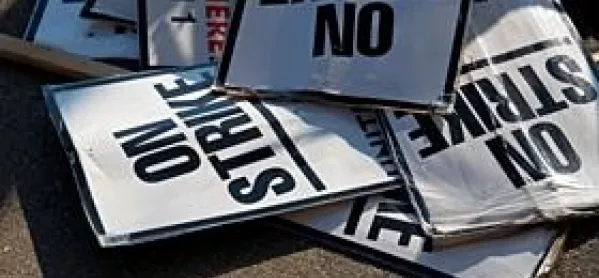Sixth-form sector fans flames of industrial action

Teachers in sixth-form colleges who took part in the 30 November strike over pensions could be forgiven for feeling a twinge of disappointment that, as usual, it was their counterparts in schools who garnered most attention in the biggest industrial action in a generation. But the sector’s workforce finally looks set to get its moment in the spotlight.
The big three unions are planning a possible strike in the sector. This time, the dispute is over pay, after the Sixth Form Colleges’ Forum (SFCF) decided not to offer an annual rise.
The NUT is balloting its members about discontinuous strike action, with the first strike likely to take place “shortly after half term”. NASUWT members are already covered for action by the union’s November ballot, and TES understands that the executive of the ATL is likely to approve a strike ballot of its sixth-form college staff when it meets next week.
Further union action is also on the cards, after the SFCF advised colleges to deduct 1260th of the annual pay of teachers who took part in the 30 November strike. School teachers had their pay docked at the lower rate of 1365th.
While the “burgundy book” national agreement for schools specifies that the deduction should be 1365th, the national pay and conditions agreement for sixth-form colleges is silent on the issue.
TES understands that the SFCF cited a historic case of deductions for non- teaching college staff as a precedent. The unions - already seething that pledges to restore pay parity with the schools sector have been shelved - believe it is fundamentally unfair that their college members have yet again ended up with a worse deal than their peers in schools. At these rates, a college teacher earning pound;30,000 a year who takes part in a one- day strike will lose pound;30 more in pay than if they worked in a school.
The NASUWT has consulted its lawyers and is preparing a legal challenge. “If the odds of the case being successful are good, we will take it forward,” the union’s general secretary Chris Keates told TES. “According to the initial advice we’ve received, the odds look good.”
While school teachers are not striking over pay, despite being partway through a two-year pay freeze, the unions believe that the circumstances in colleges are different. Following a tiny 0.75 per cent increase last time around, they hoped that colleges would come good on their earlier pledge to close the gap on schools when finances had improved. SFCF chief executive David Igoe argues that colleges simply cannot afford to do that at present because of funding cuts.
As a result, the NUT is holding two ballots, one against the government and one against sixth-form teachers’ employers.
Despite admitting that ministers have “ultimate responsibility for setting funding levels in the sector”, the union’s general secretary Christine Blower said that its members “do not accept (the SFCF’s) argument that they have no choice but to impose a pay freeze on teachers, in addition to the increased workload and job losses that have already taken place”.
To make matters worse, the NASUWT is also looking to take action. “We have already said to the NUT that, if they are balloting their members, there are some serious issues on workload and pay in the sector, so there could be the potential for coordinated action,” Ms Keates said.
It is the attitude taken by colleges that has irked teachers the most, ATL’s head of pay, conditions and pensions Martin Freedman believes. “Although sixth-form colleges have suffered financially, we could have reached some sort of settlement if the employers had been willing to talk. The `zero per cent and no discussions’ line has caused unnecessary resentment and anger among teachers,” he said.
Mr Igoe described the NUT’s stance as “counterproductive”, with colleges facing funding cuts of as much as 20 per cent. “In the context of a two- year pay freeze in schools, we think that’s not unreasonable. We are trying to be clear and realistic about the situation colleges are in. We are very happy to talk.”
DOWNWARD TREND 0.75% - Last year’s pay rise for sixth-form college teachers 0% - This year’s pay rise for sixth-form college teachers Strike deduction (before tax) for a sixth-form college teacher earning pound;30,000: pound;115.38 - Under 1260th calculation pound;82.19 - Under 1365th calculation. Original headline: Sixth-form sector fans the flames of industrial action over pay issues
Keep reading for just £1 per month
You've reached your limit of free articles this month. Subscribe for £1 per month for three months and get:
- Unlimited access to all Tes magazine content
- Exclusive subscriber-only stories
- Award-winning email newsletters



